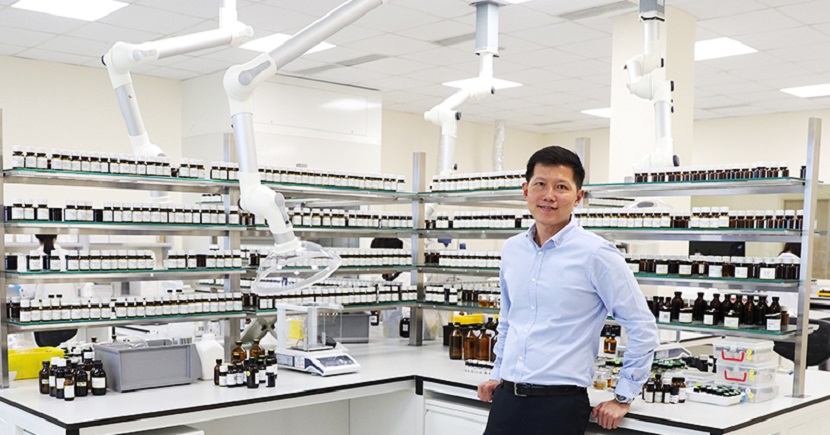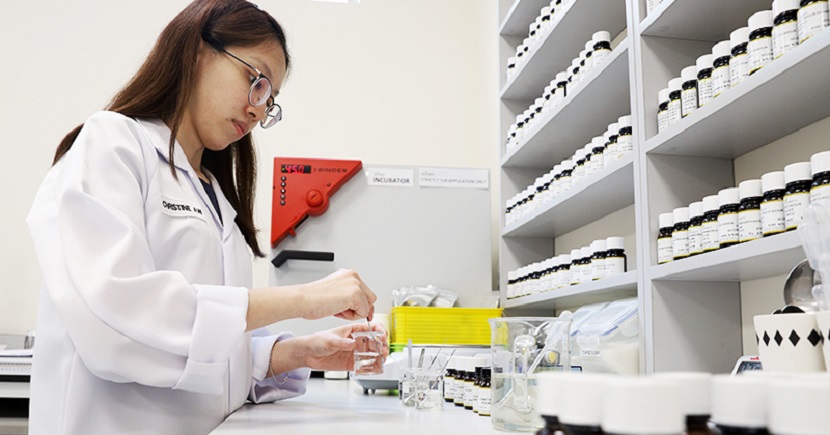First published in The Business Times on 27 November 2019.
With its first factory at Wan Lee Road "almost bursting at the seams", the senior management at KH Roberts was faced with an important decision: to build a new factory or continue working within existing constraints.
"We were taking on so many sales and customer orders but because of the limits of the facility, we couldn't really cope," says Tan Pok Kiam, general manager - sales/group marketing, at KH Roberts Group.
"We were at this juncture where we either say this is sufficient for us, or that we're still hungry and we want to grow further."

Staying hungry
The Wan Lee Road site was flavour house KH Roberts's first factory. The original single-storey factory was built in 1968 and a second floor was added over the course of two major renovations. Space was still an issue, however, as were the increasingly rigorous demands imposed by food and safety standards.
"Some of these standards require certain building infrastructure. For example, you may need some segregation for good practices like allergenic material and cross-contamination control. With the limits of the old facility, there were certain requirements that were increasingly challenging to fulfil," explains Mr Tan.
The firm was well aware of the importance of adopting international food safety management systems, which were essential for it to grow internationally and to compete with multinational flavour houses.
In fact, Enterprise Singapore supported KH Roberts on the adoption of international food safety management (ISO 22000); KH Roberts also attained ISO 9001: 2015, ISO 14001: 2015 and GMP certificates.
The company was by then FSSC22000-compliant but with every upgrade of the standards, it became increasingly challenging for the company to comply, given the limitations of the old factory.
Built on a greenfield plot, the new facility was designed to comfortably meet any relevant food safety requirement, while also giving the company the space to plan for upgrades.
Today, the Buroh Lane premises boast automated production activities. The facility also has well-equipped and regulation-compliant pilot trial plants, a rare resource for local food manufacturing companies that mostly go straight into full-scale production.
The company is also gearing up to enter phase two of the automation journey, which will include automated guided vehicles (AGVs) and RFID technologies.
"We're probably deploying AGVs in our production and warehouse (where) there's a lot of repetitive manual work," says Mr Tan.
The completion of this next phase of automation is expected to further boost efficiency in the company, which already enjoys higher efficiencies following the move.
In the current facility, for instance, about 50 to 60 per cent of materials are automatically dispensed in the required quantities at the touch of a button. Previously, production operators would weigh out ingredients on scales. Even if mistakes were made, quality checks would only take place after the mixes were blended.
"With the AGVs and some of the smart systems in place, we hope to minimise or totally eradicate these manual errors," says Mr Tan.

Innovation at its core
While KH Roberts may not ring any bells for the average consumer, the company is the hidden hand behind many familiar tastes and scents. A flavour it recently developed and is particularly excited about is coconut palm sugar.
Colloquially known as gula melaka, this particular flavour profile is receiving keen interest, thanks in part to the bubble tea trend, but also to cater to consumers who are increasingly conscious of their sugar intake but still want that unique taste.
"Our flavours do not contain sugar so they're not sweet. But they mimic the profile of sugar. Gula melaka, brown sugar, red sugar and regular white cane sugar all have different taste profiles," says Mr Tan. "Ever since it (gula melaka) was launched we've received quite good feedback that it almost smells and tastes like the real thing."
KH Roberts is also tracking larger trends like the growing awareness of and demand for clean labels and natural foods. According to Go Clean Label, clean label refers to food products containing natural, familiar and simple ingredients that are easy to recognise, understand and pronounce, with no artificial ingredients or synthetic chemicals.
Working with natural ingredients is more challenging because of its inherent price volatility.
"If you look at the last two years, the prices of natural vanilla and its derivatives are sky high because of disruptive weather and lower harvests. Sometimes, people also drive the prices up because they know natural vanilla is prized by the food industry."
According to data from KH Roberts, prices have increased by more than 400 per cent since 2015.
"Demand and supply for natural materials are never in balance. Prices will always be high so we need to look at how to work with natural ingredients sustainably."
The firm also actively seeks out collaboration opportunities. KH Roberts has a long tradition of cooperating with external partners, ranging from local and regional institutes of higher learning, SMEs, startups and public research agencies. The new site, with its R&D facility and pilot plant, allows for more effective collaboration.
The firm is in fact a resource partner under FoodInnovate, a multi-agency initiative to equip Singapore-based companies with knowledge and resources to pursue food innovations, with the vision to position Singapore as a location of choice to create food for Asia.
Announced in April last year, FoodInnovate is led by Enterprise Singapore, and includes Agency for Science, Technology and Research (A*STAR), Agri-Food and Veterinary Authority (AVA), Economic Development Board (EDB), IPI Singapore and JTC Corporation.
It is anchored on four key pillars -- infrastructure, knowledge-building, co-innovation and disruptive technologies.
As part of efforts to increase access to infrastructure, Enterprise Singapore works with partners to set up shared facilities.
"These facilities provide food manufacturers with ready infrastructure to test-bed new ideas and technologies, as well as to accelerate and scale up commercialisation efforts," says Bernice Tay, director of food manufacturing division at Enterprise Singapore.
"Utilising a pay-per-use model, food companies are able to reap the benefits of using advanced technology without huge capex investments."
Examples of these shared facilities include the High Pressure Processing Resource Sharing Facility and the upcoming small batch production facility to be located in the JTC Food Hub @ Senoko.
Says Mr Tan: "We're doing our part to contribute back to the industry. We understand that a lot of startups and SMEs may not have access to materials and labs."
Meeting and working with such partners also allow for knowledge sharing, he said.
Continuous journey
With a wide range of products and customers ranging from large multinationals to SMEs, KH Roberts often has to tailor its batch sizes accordingly.
How then does automation, which is often seen as a way to boost output, help the business?
"Companies need to recognise what their objective for automation is," says Mr Tan.
He explains: "Say I'm doing a batch of 100-pound cakes. Many people would say 'I'm automating (the process) with an automated line'. I think there's a misunderstanding of the term in the industry. I would call that mechanisation; you mechanise the action to replace manual labour.
"Automation is a much bigger word in today's context."
Instead, companies need to review their core activities and ask themselves: Is human intervention required because of artistic input? Can mechanisation solve the labour aspect of the problem? Or is automation the solution?
KH Roberts's liquid flavour distribution and dispensing system, for instance, was specially designed for high mix low volume production, enabling the firm to be more agile in supporting clients, regardless of their size, says Enterprise Singapore's Ms Tay.
"We assisted KH Roberts on a consultancy project to design and optimise the layout of its new integrated manufacturing facility. The facility features a S$3.2 million automated liquid flavour distribution and dispensing system, which we also supported," she says.
Indeed, the agency has supported more than 280 automation projects since the launch of the Food Manufacturing Industry Transformation Map in 2016. This is already a 75 per cent increase compared to the period between 2011 and 2015 when 160 automation projects were supported.
"We are seeing efforts from food manufacturers to be more productive by automating manual production processes, and adopting technologies to support their product development and market expansion efforts," says Ms Tay.
"Productivity improvement is one of the key pillars in the Food Manufacturing Industry Transformation Map and it is encouraging to see more companies are on the drive to enhance their operational efficiency."
KH Roberts takes an equally studied approach to digitalisation. Earlier this year, the firm was the Singapore awardee for "Most Promising Digitalised Micro, Small, Medium-sized Enterprises" at the Asean Business Awards. This comes on the heels of an "SME Excellence - Innovation" award at the previous year's Asean Business Awards.
But Mr Tan is quick to point out that the journey is far from over.
"Technology evolves and in today's context it's evolving and improving very quickly. So we're playing catch-up every day. Our IT team is always finding out about the latest systems to see how we can upgrade or how we can integrate our systems."
Next big challenge
With its fundamentals in place, or at least integrated in its model of continuous improvement, KH Roberts is ready to take on its next big challenge.
The firm is one of 25 local companies taking part in the inaugural run of the two-and-a-half-year Scale-up SG programme, which aims to help aspiring, high-growth local companies scale rapidly.
The programme is run by Enterprise Singapore, in collaboration with public and private sector partners, including government agencies, management consulting firms, professional services firms, institutes of higher learning, research institutes and private equity funds.
It has just wrapped up the four-month long strategic planning phase with its chosen consultancy. The inaugural programme is run with McKinsey & Company and PwC Singapore as anchor partners.
"We work with external consultants who review our business model, strategies, and strengths... They interviewed us as well as our customers, getting a very in-depth view of the environment as well as the challenges we face. It was very intensive because they really tear everything down. They ask for everything, all the way from past financials to projections.
"The most important takeaway for us is validating what we believe. With this information verified and validated, we can now talk about strategy and how to execute," says Mr Tan.
"The validation reassures the management that we're on the right track. And since we're on the right track we should double down instead of strolling."


